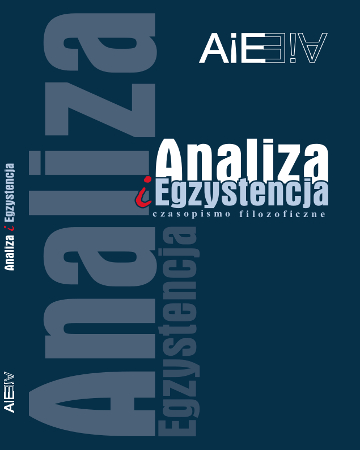
ISSN: 1734-9923
eISSN: 2300-7621
OAI
DOI: 10.18276/aie.2020.49-04





Lista wydań /
49 (2020)
Towards a Poor Phenomenology. On Certain Structural Similarities between Phenomenology and J. Grotowski’s Philosophy of Theater
| Autorzy: |
Daniel
Sobota
Instytut Filozofii i Socjologii PAN |
| Słowa kluczowe: | phenomenology theater Jerzy Grotowski praxis |
| Data publikacji całości: | 2020 |
| Liczba stron: | 29 (89-117) |
Abstrakt
In his phenomenological manifesto (1911), Edmund Husserl presents the famous motto, which should be realized by the new philosophy: “Weg mit den hohlen Wortanalysen. Die Sachen selbst wir müssen befragen. (...) Ganz trefflich! Aber was sind denn die Sachen (...)?“ Consequently, the history of phenomenology is presented as the sum of the efforts to reach the deeper level and more fundamental areas of the original "Sachen". Husserl’s discovery of the domain of pure consciousness was only the beginning of a long way leading to more original areas, such as life, existence, body, intersubjectivity, historicity, humanity etc. With this journey towards deeper fields of sense-constitution, the meaning of the phenomenological method was changed. Phenomenology cannot be a simple work of lonely soul looking for self-transparency in the field of its own consciousness, but it must be a kind of action, a deed, an existential transformation, and an increase of experience. Recently, e.g. Natalie Depraz presented a similar view. In my paper I would like to explore the possibility of a new perspective on phenomenology, which gives the philosophy and theatrical practice of Polish theater reformer Jerzy Grotowski (1933-1999). Although he was neither phenomenologist, nor a philosopher, in his notes on the human performance, collected and entitled Thoward a Poor Theater, he opens, as it seems, new possibilities of phenomenological practice.
Pobierz plik
Plik artykułu
Bibliografia
| 1. | Artaud, A., Teatr i jego sobowtóry, translated by J. Błoński, Wyd. Czuły Barbarzyńca, without a place or date. |
| 2. | Bacon, F. (1905). Works, ed. J.M. Robertson, London: Routledge. |
| 3. | Brook, P. (2007). Teatr jest tylko formą. O Jerzym Grotowskim, the collection of essays: G. Banu, G. Ziółkowski, Wrocław: Wyd. Instytut im. J. Grotowskiego. |
| 4. | Degler, J., Ziółkowski, G. ed. (2016). Misterium grozy i urzeczenia. Przedstawienia Jerzego Grotowskiego i Teatru Laboratorium, Wrocław: Instytut im. Jerzego Grotowskiego. |
| 5. | Depraz, N. (2010). Zrozumieć fenomenologię. Praktyka konkretu, trans. by A. Czarnacka, Warszawa: Oficyna Naukowa. |
| 6. | Gajda, J. (1996). Pitagorejczycy, Warszawa: WP. |
| 7. | Grotowski, J. (2012). Teksty zebrane [Collected texts], Warszawa: Wyd. Instytut im. J. Grotowskiego, Instytut Teatralny im. Z. Raszewskiego, Wydawnictwo Krytyki Politycznej. |
| 8. | Grotowski, J. (1984). Towards a Poor Theater, London: Methuen. |
| 9. | Heidegger, M. (1987). Being and Time, transl. by J. Macquarrie and E. Robinson, Oxford: Basil Blackwell. |
| 10. | Henry, M. (2007). O fenomenologii, trans. by. M. Drwięga, Warszawa: Institut of Philosophy and Sociology in Polish Academy of Sciences. |
| 11. | Husserliana, (1980) Vol. XXIII. Phantasie, Bildbewusstsein, Erinnerung. Zur Phänomenologie der anschaulichen Vergegenswärtigungen. Texte aus dem Nachlass (1898-1925), E. Marbach (ed.), The Hague-Boston-London: Martinus Nijhoff. |
| 12. | Husserliana (1976) Vol. III/I. Ideen zu einer reinen Phänomenologie und phänomenologischen Philosophie. Erstes Buch, K. Schuhmann (ed.), Den Haag: Martinus Nijhoff. |
| 13. | Husserl, E. (1997). Erfahrung und Urteil: Untersuchungen zur Genealogie der Logik, Hamburg: Felix Meiner Verlag. |
| 14. | Husserl E., Philosophie als strenge Wissenschaft, Logos. Internationale Zeitschrift für Philosophie der Kultur 1(1910–11), (translated by Marcus Brainard). |
| 15. | Diogenes Laertius (2013), Lives of Eminent Philosophers, ed. T. Dorandi, Cambridge: University Press. |
| 16. | Nietzsche, F. (1905). The Complete Works. Vol I: The Birth of Tragedy or Hellenism and Pessimism, transl. by A. Haussmann, London. |
| 17. | Nietzsche, F. (1905-1906). Z genealogii moralności. Pismo polemiczne, transl. by L. Staff, Warszawa: Nakład Jakóba Mortkowicza. |
| 18. | Osiński, Z. (1980). Grotowski i jego Laboratorium, Warszawa: PIW. |
| 19. | Osiński, Z. (2009). Jerzy Grotowski. Źródła, inspiracje, konteksty, vol. I, Gdańsk: Wydawnictwo Słowo/obraz terytoria. |
| 20. | Osiński, Z. (1972). Teatr Dionizosa. Romantyzm w polskim teatrze współczesnym, Kraków: Wyd. Literackie. |
| 21. | Osiński, Z. (2004). Pamięć Reduty. Osterwa, Limanowski, Grotowski, Gdańsk: Wyd. słowo/obraz terytoria. |
| 22. | Osterwa, J. (1991). Reduta i teatr. Artykuły, wywiady, wspomnienia. 1914–1947, Wyd. Wiedza o Kulturze. |
| 23. | Schapp, W. (1976). Beiträge zur Phänomenologie der Wahrnehmung, Wiesbaden: B. Heymann Verlag. |
| 24. | Scheler, M. (1987). Pisma z antropologii filozoficznej i teorii wiedzy, trans. S. Czerniak, A. Węgrzecki, Warszawa: PWN. |
| 25. | Sobota, D.R. (2017), Narodziny fenomenologii z ducha pytania. Johannes Daubert i fenomenologiczny rozruch, Warszawa: Wyd. Instytut Filozofii i Socjologii PAN. |
| 26. | Spiegelberg, H. (1975). Doing Phenomenology. Essays on and in Phenomenology, Phaenomenologica 63, The Hague: Nijhoff Verlag. |
| 27. | Stanislavski, K. (1988). An Actor Prepares, London: Methuen. |
| 28. | Waldenfels, B. (1983). Phänomenologie in Frankreich, Frankfurt am Main: Suhrkamp Verlag. |
| 29. | Waldenfels, B. (2002). Topografie obcego, transl. J. Sidorek, Warszawa: Oficyna Naukowa. |